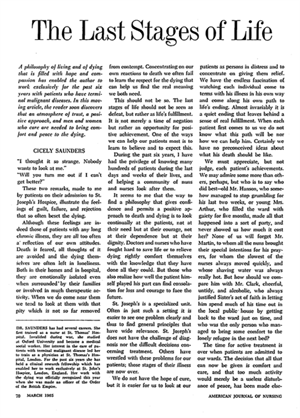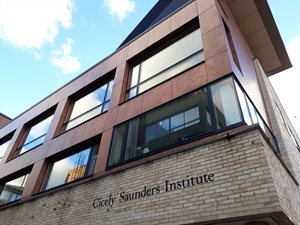100 papers that changed palliative care
Today marks 100 years since the birth of Cicely Saunders. Dame Cicely Saunders is widely acknowledged as the founder of the modern hospice movement. In her Desert Island Discs interview in 1995 she recalls working at St Thomas’ hospital in the 1950s, where she made the troubling observation that ‘doctors desert the dying’.
This observation changed medical practice.

©photo by Derek Bayes.
Cicely decided to make it her life’s work to improve how we care for the dying. She trained as a doctor, having originally been a nurse and an almoner (social worker), and soon afterwards left the NHS to found St Christopher’s Hospice in South London.
Cicely Saunders’ contribution to clinical care for the dying is rightly famous. Less often acknowledged is her important contribution to research and evidence to guide this clinical practice. From the start she envisaged hospices as a place where research and clinical care would occur side by side, each informing the other. She herself did and supported others to do groundbreaking research, including on pain and into the safety of opioids. At the time, in the 1950s and 60s, there were fears that dying people would become addicted, or tolerant, to opioids. Cicely’s research showed that this fear was unfounded and that dying people could be safely given opioids to preempt pain, at the time a fairly radical suggestion.

Throughout her later years Cicely had a vision for an institute dedicated to palliative care that would combine research and education with clinical care, with the aim of improving care and therapies for people approaching the end of life, and those close to them, wherever they are cared for. In 2010, five years after her death, the Cicely Saunders Institute of Palliative Care, Policy & Rehabilitation at King’s College London opened. To embrace the modern definitions of palliative care the Institute integrates palliative care and rehabilitation to pioneer ways to improve living well despite chronic and severe illness, as well as care at the end of life.
Since 2010 the Cicely Saunders Institute has grown to include four Professors, and around 60 research, education and support staff, as well as a multidisciplinary clinical team.
Directed by Professor Irene Higginson, the Institute does cutting edge research into evaluating and improving care and treatment, person-centred outcome measurement, symptom-focused clinical research, and living and dying in society. Patients and families are at the centre of what we do and are involved in our research from conception to dissemination.

Since the Cicely Saunders Institute opened in 2010 we have published over 500 research papers. As part of the #Cicely100 celebrations, starting from today we will be tweeting a paper every day for 100 days from our @csi_kcl account to highlight the breadth and impact of our research. These 100 papers have been chosen because they have led to change: from impacting on clinical care, to policy and education, to the research field itself through methodological development.
100 papers that changed palliative care is our way not only of celebrating the centenary of Cicely Saunders’ birth, but also highlighting the impact that her vision continues to have throughout the world.
Dr Katherine Sleeman
NIHR Clinician Scientist and former Cicely Saunders International Scholar
Twitter: @Kesleeman